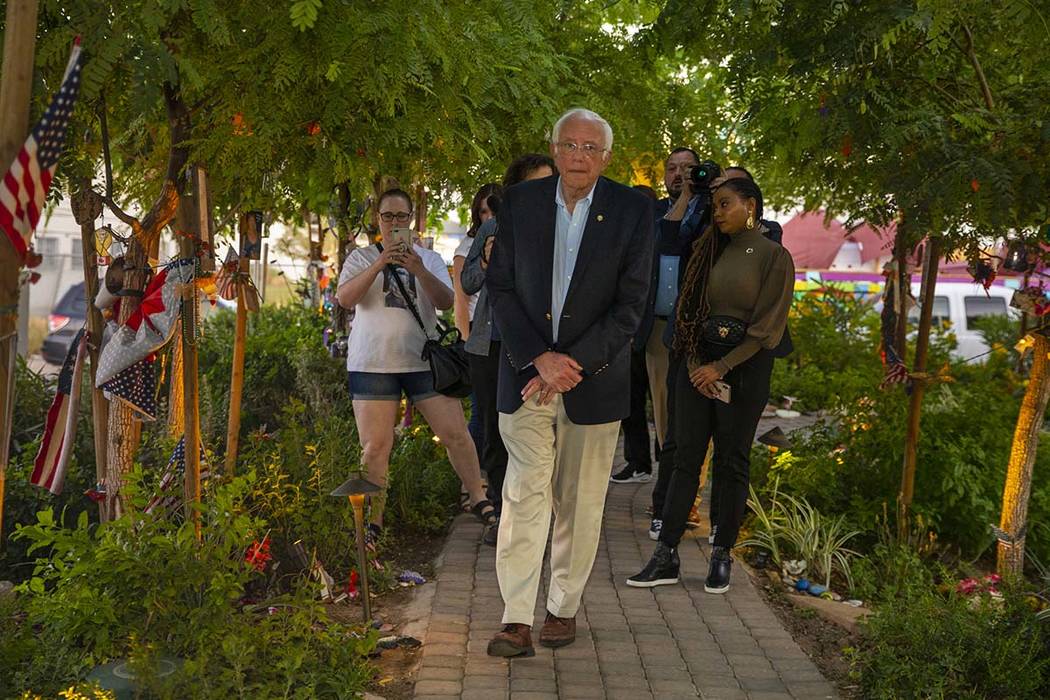Las Vegas cardiologists discuss Bernie Sanders’ heart condition
With the severity of his heart condition unknown, it’s too soon to say when — or even if — Democratic presidential candidate Bernie Sanders might return to the campaign trail, according to two Las Vegas cardiologists.
Sanders’ medical prognosis — and the future of his campaign — depend “on whether or not he had a heart attack,” said Dr. Keith Boman, a cardiologist who has practiced in Las Vegas for 40 years.
Boman, who is not one of Sanders’ doctors, noted that chest pain “would be a typical presentation for a blocked artery or for a heart attack.”
Sanders’ campaign stated that he had blockage in one artery and had two stents successfully inserted. The candidate had experienced “chest discomfort” at a campaign event in Las Vegas on Tuesday. Official campaign statements did not say whether Sanders experienced a heart attack. The Wall Street Journal quoted campaign spokesman Mike Casca on Wednesday as saying Sanders did not have a heart attack, then updated the story to say Casca later stated that more tests would be run to determine that diagnosis.
To insert a stent, doctors thread a tiny balloon inside a blocked artery to widen it. The stent, a small wire mesh tube, is then inserted to keep the artery open.
Following the insertion of stents, a patient who has not had a heart attack typically is hospitalized for a day or two for observation, after which there are minimal restrictions on activity, Boman said. The patient might also be prescribed a blood thinner and other medications. If a stress test found that a patient was fit to resume full activity, he might only be sidelined for a couple of weeks.
In such a scenario, “The prognosis is usually good,” Boman said.
If a patient has had a heart attack, he typically is hospitalized for a longer period that depends on the severity of the attack, after which there likely are restrictions on vigorous activity.
“A heart attack means there was some damage to the heart,” Boman said, adding that “you can easily have chest pain without damage to the heart.”
Coronary artery disease is not unusual in a person older than 70, Boman said. Sanders is 78.
Las Vegas cardiologist Buddha Dawn said a variety of factors will determine Sanders’ next steps.
“His return to the campaign trail would be dictated by his overall health status” and his symptoms, said Dawn, chairman of the Department of Internal Medicine at the UNLV School of Medicine.
“If it is an uncomplicated stent placement, the outcomes can be really good,” said Dawn, who also has not been involved in Sanders’ care.
Under these circumstances, a return to full activity would likely take several weeks at best, he said.
However, there is a “long list of complications that can happen both during and immediately after … and a very long interval after stent placement,” Dawn said.
Possible complications include bleeding, infection, a small heart attack and arrhythmia, when the heart beats with an irregular or abnormal rhythm.
“The primary outcome we want to avoid is stent closure” and a return of the blockage, Dawn said.
Stents are threaded into place through blood vessels in the groin or wrist. Most are coated with medication to prevent the artery from closing.
Ultimately, Dawn said, Sanders’ return to campaigning will be “largely dictated by his evolving medical condition.”
Contact Mary Hynes at mhynes@reviewjournal.com or 702-383-0336. Follow @MaryHynes1 on Twitter. The Associated Press contributed to this report.

















